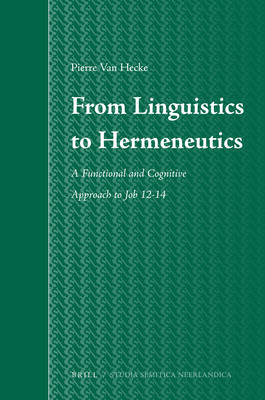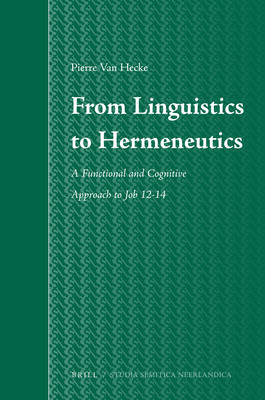
Je cadeautjes zeker op tijd in huis hebben voor de feestdagen? Kom langs in onze winkels en vind het perfecte geschenk!
- Afhalen na 1 uur in een winkel met voorraad
- Gratis thuislevering in België vanaf € 30
- Ruim aanbod met 7 miljoen producten
Je cadeautjes zeker op tijd in huis hebben voor de feestdagen? Kom langs in onze winkels en vind het perfecte geschenk!
- Afhalen na 1 uur in een winkel met voorraad
- Gratis thuislevering in België vanaf € 30
- Ruim aanbod met 7 miljoen producten
Zoeken
€ 364,95
+ 729 punten
Omschrijving
Linguistics and hermeneutics are often regarded as two mutually exclusive scholarly disciplines. Recent decades, however, have witnessed the rise of linguistic approaches that take meaning back to the heart of their inquiry and can be fruitful for textual interpretation. This book applies the insights of two such approaches, i.e. functional grammar and cognitive semantics, to the study of Biblical Hebrew with a specific focus on Job 12-14. The result is two-fold. The study offers a detailed linguistic analysis, providing many new insights in the linguistic peculiarities of the text and Biblical Hebrew in general. Moreover, it proposes a fresh exegetical reading of Job's longest and central speech in the book.
Specificaties
Betrokkenen
- Auteur(s):
- Uitgeverij:
Inhoud
- Aantal bladzijden:
- 464
- Taal:
- Engels
- Reeks:
- Reeksnummer:
- nr. 55
Eigenschappen
- Productcode (EAN):
- 9789004188358
- Verschijningsdatum:
- 7/12/2010
- Uitvoering:
- Hardcover
- Formaat:
- Genaaid
- Afmetingen:
- 165 mm x 246 mm
- Gewicht:
- 861 g

Alleen bij Standaard Boekhandel
+ 729 punten op je klantenkaart van Standaard Boekhandel
Beoordelingen
We publiceren alleen reviews die voldoen aan de voorwaarden voor reviews. Bekijk onze voorwaarden voor reviews.









